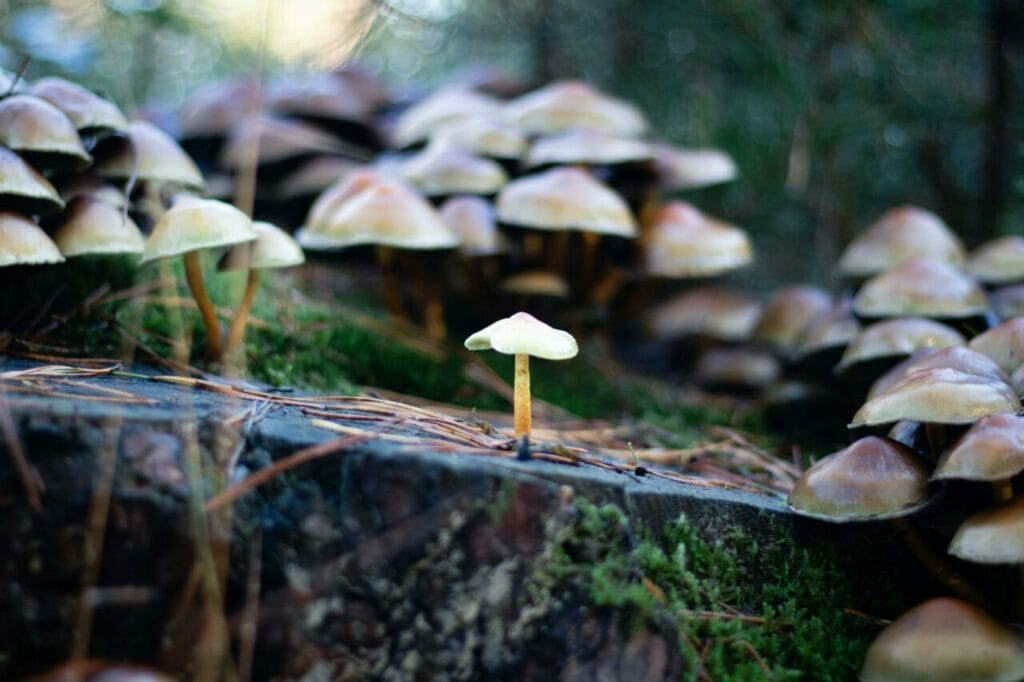Alzheimer’s Disease (AD) is a devastating neurodegenerative disease with no current cure. The increasing incidence of this disease presents a significant problem. Researchers are investigating better treatment options by studying both natural and synthetic possibilities.
Several clinical studies have highlighted the potential benefits of serotonergic psychedelics such as LSD, DMT, and psilocybin, in the treatment of Alzheimer’s disease. To gain more fascinating knowledge, feel free to explore online resources or consider “purchasing psychedelics online in Canada.”
[toc]
The Function of Psychedelics in Alzheimer’s Treatment
Conventional psychedelics demonstrate potential to treat early-stage Alzheimer’s Disease (AD) or mild cognitive impairment (MCI) by stimulating brain cell growth.
Psychedelics might promote neural flexibility for learning and memory by focusing on certain brain receptors. This could possibly slow down or even reverse the neurodegenerative effects of AD. Additionally, psychedelics could mitigate depression and anxiety, often present in AD patients, by triggering positive psychological responses.
There are ongoing debates about the workings of psychedelic treatments. Some argue that experiencing profound effects from high-dose psychedelics, such as mystical sensations or a sense of self-dissolution, is essential for gaining psychological benefits. Others believe that the key lies in the biological changes induced by these substances. Both viewpoints may have merit.
Conventional psychedelics appear to aid the brain in adjusting and reducing inflammation, even at lower doses. As a result, low-dose treatments could be beneficial for conditions like brain degeneration or migraines without significant mind-altering effects. However, for depression, anxiety, or addiction, the mind-altering effects seem essential, leading to self-reflection and behavioral modifications. Hence, both low and high doses deserve investigation for personalized therapy.
The Impact of Serotonergic Psychedelics
Serotonergic psychedelics, comprising LSD (lysergic acid diethylamide), DMT (dimethyltryptamine), and psilocybin (found in magic mushrooms), are garnering
Psychedelics are gaining attention due to their possible therapeutic effects on different mental health disorders.
Specialists point out that serotonin receptors, recognized for their capacity to boost cognition and regulate neuroplasticity, are a hopeful focus in Alzheimer’s Disease (AD) research.
These substances primarily exert their pharmacological influence by modifying the serotonin system in the brain, leading to alterations in perception, mood, and consciousness. Here are some research findings that support this theory:
- In particular, the 5-HT2A subtype of the receptors affects the gene expression of neuroplasticity-promoting neurotrophins in brain areas impacted by AD.
- These receptors control cortical signalling, vital for cognition, memory, and synaptic plasticity.
- Even with their unusual distribution in neurons, serotonin receptors play a role in neural development, regeneration, and plasticity.
Significant Research Findings
- Serotonergic psychedelics have shown potential in lessening aspects of AD pathology by encouraging neuroplasticity.
- Classic psychedelics affect neurotransmission, promote synaptic remodelling, and increase factors supporting neuronal survival.
- Specific psychedelics, such as muscimol and Sig-1R agonists, may reduce the neurotoxicity associated with AD progression.
- Classic psychedelics stimulate pathways in brain areas affected by AD, indicating potential for slowing or reversing brain degeneration.
- Psilocybin mushrooms activate neural plasticity to promote neurogenesis and initiate long-lasting changes in brain circuits.
- Psychedelics improve brain connectivity by targeting receptor genes and instigating changes in neurons and networks.
Clinical studies show that both traditional and non-traditional psychedelics from magic mushrooms affect various biological functions in the brain. These impacts include swift changes in gene expression and substantial shifts in brain structure and function.
These psychedelics interact with receptors like serotonin, sigma, NMDA, and GABA, leading to increased synaptic plasticity and brain rejuvenation. Hence, psychedelics could potentially have positive impacts on behaviour, memory, and cognition, positioning them as promising candidates for the treatment of AD and related disorders.
Buy Psychedelics From a Reputable Online Source in Canada
If you’re considering microdosing magic mushrooms, you’ve come to the right place. Our online store, based in British Columbia, Canada, offers a wide variety of psychedelic products. We suggest beginning your exploration with a reliable medicinal mushroom dispensary.
- LSD
LSD is a manufactured drug that is derived from a fungus called ergot, which grows on rye grains. This potent psychoactive compound can modify perceptions, feelings, and thoughts, even in small quantities.
Excessive intake of LSD can lead to vivid hallucinations, altering your concept of time and space. Be cautious, as substances marketed as LSD might actually be other drugs like NBOMe or members of the 2C drug family.
| Product | Kittease – Ketamine Microdose Troche (30x50mg) | Zenly – LSD Gel Tabs – 600ug (100ug Per Tab) | Zenly – LSD Gummies – Sour Zen Berry – 200ug (100ug Per Gummy) |
| Purpose | Stress management, depression alleviation, pain control, PTSD relief, OCD management, work stress reduction, performance anxiety management, sleep disorder treatment, and addiction therapy. | Exceptional experiences | Exceptional experiences |
| Dosage | 50mg per troche / 30 per pack – 1.5 grams of ketamine/ per pack | 600ug total/6 Tabs (100ug/Tab) | 200ug total/2 Gummies (100ug/Gummy) |
| Usage Instructions | Consume one complete troche | Swallow one entire tab to feel the full effects. Wait a minimum of 2 hours before consuming another. | Consume one entire gummy to feel the full effects. Wait a minimum of 2 hours before consuming another. |
| Advantages | Quick action with minimal risk, enhanced receptiveness, optimal for introspection and cognitive improvement. | Accurately measured dose for the perfect trip, laboratory-verified | Accurately measured dose for the perfect trip, laboratory-verified |
- Magic Mushrooms
Over 180 varieties of mushrooms are known to contain psilocybin and psilocin, substances noted for their therapeutic properties and beneficial effects. on mental health.
The impact of consuming mushrooms can vary on factors such as the type of mushroom, the cultivation batch, the quantity consumed, and the individual’s tolerance. Some people choose to microdose to experience subtle effects, while others take larger amounts for a more intense experience. The quality of the mushrooms can also differ based on the cultivation methods.
Blue Meanies, scientifically known as Panaeolus cyanescens, are small, dried fungi that flourish in warm, tropical climates, usually on cow and water buffalo dung. As they grow, blue spots appear on their surface, which is how they got their name.
- These fungi have high concentrations of psilocybin and psilocin.
- Blue Meanies have been used recreationally, especially among the Balinese people, who consume them during celebrations and for artistic inspiration.
- Due to their hallucinogenic properties, they are popular among tourists and travelers in Bali and other similar places. The effects may include feelings of euphoria, hallucinations, joy, and intense laughter.
- DMT
DMT, a potent hallucinogenic compound, is present in certain plants like Psychotria viridis and Chacruna. Often termed the “spirit molecule,” these controlled substances can produce deep psychedelic experiences. They offer a short but intensely immersive journey characterized by bright visual and auditory hallucinations.
| Product | Dream Machine – Vape Cartridge – DMT 1ml | Integral Alchemist – ACACIA Changa Pre-Roll | Integral Alchemist – Mimosa- 1ml DMT Vape Cart | |
| Description | Explore hyperdimensional realms with DMT. | Experience effects akin to ayahuasca, with a blend of herbs and DMT. | Begin a journey of mystical visions and spiritual revelations with DMT. | |
| DMT Content | 1g | About 90mg | 1ml | |
| Instructions | Preheat the cartridge and inhale | Proceed with caution. | Consume the pre-roll at a pace that feels comfortable to you. | Draw in the vapor for immediate results. |
| Effects | Intense hallucinations, altered state of consciousness. | Prolonged visual psychedelic experience. | Spiritual awakening, feelings of euphoria, significant changes in perspective. | |
| Duration | Varies from person to person | Can last up to 1 hour | May continue for up to 30 minutes |
Long-Term Implications of Psychedelic Use
Current research seeks to comprehend the enduring consequences of consuming psychoactive drugs. The phrase “long-term effects” refers to any lasting changes in cognitive processes, emotions, or memory following prolonged psychedelic use, even though our understanding in this area is still evolving.
The study of psychedelics’ long-term effects is complex. Some studies propose potential mental health benefits, while others point to potential hazards such as inducing psychosis.
Despite these complexities, researchers persist in their efforts to understand the effects of long-term psychedelic use on mental health. They are conducting rigorous research, observing subjects over extended timeframes to collect more accurate data.
Purchase Cannabis from a Reputable Dealer
Current research suggests a significant change in Alzheimer’s disease treatment, indicating that psychedelics could fundamentally alter how we manage brain disorders. Specialists are of the view that a therapeutic use of these substances could revolutionize Alzheimer’s treatment, offering new hope to numerous patients and their loved ones.
For premium products, consider a certified dealer like Mushrooms Online Canada. Offering a wide variety of cannabis products such as flowers, edibles, concentrates, and more, Mushrooms Online Canada assures genuine, lab-tested items that conform to strict food and drug standards.
Order your shrooms online now.
Frequently Asked Questions
How are psychedelics distinct from other substances typically used in Alzheimer’s treatments?
Psychedelics differentiate themselves from traditional Alzheimer’s medications in their therapeutic strategy and outcomes. They create new neural connections by focusing on the brain’s serotonin system, fostering profound psychological experiences that bolster emotional health.
Unlike conventional medications that primarily manage symptoms, psychedelics are under review by Health Canada for their long-term benefits and comprehensive treatment approach, which combines therapy.
Investigation into the use
Psilocybin has unique properties that could be beneficial for conditions like obsessive-compulsive disorder. Its safety profile, which includes low risk of multi-system organ failure, distinguishes it from many conventional controlled substances.
Can psychedelic-assisted therapy be a viable treatment option for Alzheimer’s patients facing end-of-life distress?
Psychedelic-assisted therapy could potentially offer benefits to Alzheimer’s patients who are in the advanced stages of their disease and dealing with the existential distress associated with end-of-life.
- Emotional relief. This therapy can help reduce feelings of anxiety and depression, especially in individuals who are critically ill. It could be beneficial for Alzheimer’s patients as well.
- Safe when monitored. Psychedelics, when used in a secure and controlled environment under the supervision of a professional, are typically safe and well-tolerated by most individuals.
- Potential to improve quality of life. For an individual with Alzheimer’s, even a slight emotional boost can make a significant difference, despite the continued presence of memory problems.
- Further research required. While this therapy shows promise, more comprehensive studies are needed to validate its safety and effectiveness for Alzheimer’s patients, especially those in the final stages of life.
How long does a psychedelic therapy session for Alzheimer’s patients last?
- Preparation Phase. This initial phase involves one or two sessions that last for 1 to 2 hours each. The goal is to ready the patient for the therapy, set the right expectations, and establish trust with the therapist.
- Main Psychedelic Session. The central session where the patient consumes the psychedelic substance usually extends from 4 to 6 hours. The patient is monitored in a controlled setting, often lying down with eye shades and listening to music, under the close supervision of therapists.
- Integration Phase. After the main session, follow-up meetings are held to help the patient understand and incorporate their experience. These sessions typically last for 1 to 2 hours each, with the total number of sessions varying.
You may also be interested in:





